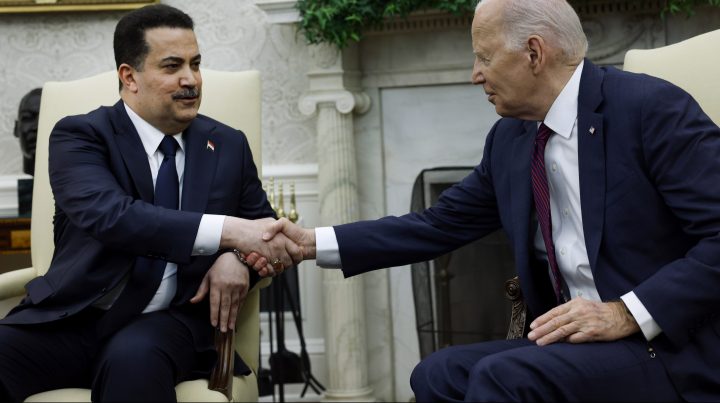MIDDLE EAST CRISIS UPDATE: 16 APRIL 2024
Biden meets with Iraq’s Prime Minister; Iran’s attack ‘will be met with a response’ – Israel

US President Joe Biden said the response to Iran’s attack over the weekend showed the US was committed to Israel’s security and he hoped to prevent the conflict in the Middle East from escalating.
Top Israeli military officials reiterated the country had no choice but to answer Iran’s weekend drone and missile attack, even as European and US officials boosted calls for Israel to avoid tit-for-tat escalation that could provoke a wider war.
Iran’s first direct attack on Israel over the weekend has complicated flights in one of the most densely traversed regions of the world, forcing airlines to choose lengthy detours from cities like London and Paris to destinations in the Persian Gulf or India.
Biden endeavours to prevent spread of conflict after Iran attack
President Joe Biden said the response to Iran’s attack over the weekend showed the US was committed to Israel’s security and that he hoped to prevent the conflict in the Middle East from escalating.
“Iran launched an unprecedented attack on Israel, and we mounted an unprecedented military effort to defend it. Together with our partners, we defeated that attack,” Biden said during an Oval Office meeting with Iraqi Prime Minister Mohammed Shia al-Sudani about the barrage of missiles and drones.
“We’re committed to a ceasefire that will bring the hostages home and prevent the conflict from spreading beyond what it already has,” Biden added.
Biden and top US officials have urged restraint — hoping to avoid a broader regional war — and highlighted the coalition that came to Israel’s defence in a bid to convince Israeli Prime Minister Benjamin Netanyahu to de-escalate the military campaign against Hamas in the Gaza Strip that has sparked a humanitarian crisis.
The Iranian attack did not cause any fatalities or serious damage after being largely intercepted by Israeli defence systems alongside US, UK, and French military assets. Those included US troops in Erbil, Iraq manning a Patriot missile system that helped intercept a ballistic missile headed toward Israel, along with two US fighter squadrons that took down attack drones.
Tensions between Israel and Iran have flared since the 7 October attack on Israel by Hamas, which the US and European Union have designated a terrorist organisation.
Israel has since conducted a punishing campaign against Hamas in Gaza — prompting Biden and other world leaders to express humanitarian concerns — and targeted other Iran-backed militia groups. Iran’s attack followed an Israeli strike on an Iranian consulate in Damascus, Syria, that killed top Iranian military commanders.
“We’re also committed to the security of our personnel and partners in the region, including Iraq,” Biden said alongside al-Sudani.
Iran’s unprecedented direct attack on Israel led to calls for action on Capitol Hill. The White House is hopeful the conflict will spur House Republicans to move forward with legislation, already passed by the Senate, that would provide billions of dollars in additional military aid for both Israel and Ukraine.
Europe ramps up calls for Israeli restraint after Iran attack
Top Israeli military officials reiterated the country has no choice but to answer Iran’s weekend drone and missile attack, even as European and US officials boosted calls for Israel to avoid a tit-for-tat escalation that could provoke a wider war.
“Missiles into the territory of the State of Israel will be met with a response,” Israel Defense Forces Chief of Staff Herzi Halevi said in a speech to troops at the Nevatim air base, which was targeted in Saturday night’s attack. He spoke in front of an F-35 fighter jet, the type of plane that Israel used to help repel the Iranian barrage and could play a role in an Israeli counter-strike.
Focus has shifted to the timing and nature of the possible Israeli response. Netanyahu must weigh his desire to strike back after Iran’s unprecedented direct attack against the pressure from Biden and other leaders to hold back and keep the international scrutiny on Iran’s actions.
French President Emmanuel Macron said Israel must avoid worsening the situation in the Middle East. German Chancellor Olaf Scholz made similar comments while visiting China, and both his foreign minister and that of the UK will travel to Israel later this week.
The West and Arab states are trying to convince Netanyahu that an aggressive reaction to Iran’s assault on Saturday night would harm Israel’s interests. They’re also concerned it could push up oil prices, hindering central banks’ attempts to slow inflation.
Some Israeli ministers have said the country needs to carry out a harsh attack to deter Iran from any repeat assault. Netanyahu hasn’t laid out what he plans to do, beyond saying Israel will respond in some way.
The Israeli military had presented the government with a range of possible actions, Peter Lerner, a spokesman, said in a Bloomberg Radio interview.
“We need to be patient and understand that the situation here is very fragile,” he said. The government is “considering the pros and cons of each avenue.”
“We’re going to do everything we can to avoid flare-ups, and try to convince Israel that we shouldn’t respond by escalating, but rather by isolating Iran,” Macron said on Monday in an interview with France’s BFM TV and RMC radio.
Both he and Scholz condemned Iran’s actions. Macron said France may tighten sanctions against the Islamic Republic and put more pressure on it to curb its nuclear activities.
Read more:
- Iran’s attack on Israel sparks race to avert a full-blown war
- Middle East dangers escalate with Iran’s attack on Israel
- Understanding the escalating Israel-Iran conflict: QuickTake
They and other Group of Seven members spoke with one another on Sunday and said they would try to stop “an uncontrollable regional escalation.”
Iran said its actions were a legitimate response to a 1 April attack on its diplomatic compound in Syria, for which it blamed Israel. That strike killed seven Iranian officers, including two generals.
Iran-Israel conflict forces airlines to choose longer routes
Iran’s first direct attack on Israel over the weekend has complicated flights in one of the most densely traversed regions of the world, forcing airlines to choose lengthy detours from cities like London and Paris to destinations in the Persian Gulf or India.
Several Middle Eastern countries including Jordan, Iraq and Lebanon temporarily closed their airspace over the weekend as Iran launched drones and missiles. Both Israel and Iran also imposed restrictions on airline traffic, requiring airlines to reroute, thereby extending flight times and adding to fuel costs.
European airlines were taking a variety of approaches on Monday, with EasyJet pausing operations to and from Israel’s Tel Aviv, while British Airways was still operating flights to Israel and Jordan. The carrier faced disruption over the weekend when a flight en route to Jordan was forced to turn around because of the airspace closures.
Other carriers that have circumnavigated the region or stopped service to places like Israel and Jordan included Qantas Airways, Singapore Airlines, Air France and Virgin Atlantic Airways.
Air France said that it planned to restart flights to Beirut on Monday and to Tel Aviv on Tuesday, following the reopening of Israeli and Lebanese airspace. However, it said journeys to destinations such as Dubai, India and Singapore would see flight times increase by as much as 45 minutes due to changes to the flight schedule. Dutch partner KLM said it had cancelled flights to Tel Aviv on Monday.
Qatar Airways and Emirates resumed some suspended Middle Eastern services on Sunday as airspaces reopened.
Iran’s airspace is frequently used by airlines travelling between Europe and India or Southeast Asia.
Gold holds below record despite Iran’s strike against Israel
Gold traded below last week’s new high, even after Iran’s unprecedented attack on Israel over the weekend.
Bullion rose by as much as 1.2% as the conflict in the Middle East entered a dangerous new phase before the haven asset pared most of that gain on Monday. The Islamic Republic fired more than 300 drones and missiles against Israel, though most were intercepted and there were no fatalities reported.
The precious metal broke through $2,400 an ounce on Friday, but closed the session lower as technical indicators indicated its rally had run too hot and investors liquidated positions. The latest developments in the Middle East rekindled the flight to safety, with fears over a potential retaliation by Israel likely to support gold in the near term.
The escalating tensions in the Middle East were “a reason in itself to buy gold,” said Chris Weston, head of research at Pepperstone Group. “There’s a sizable geopolitical premium being priced into moves,” he said, adding that the medium-term path is likely to be higher.
Gold has surged by almost 18% since mid-February in a rally that has taken many investors by surprise. Swaps markets suggest that investors have lowered their expectations for the scope and pace of Federal Reserve cuts to interest rates this year. That would typically be a headwind for bullion, as it doesn’t pay interest.
Nevertheless, the metal has gained support from other factors including robust buying by central banks and increased demand from Chinese consumers. Rising geopolitical risks in the Middle East and Ukraine have boosted the metal’s haven appeal. DM
Read more in Daily Maverick: Middle East crisis news hub


















 Become an Insider
Become an Insider
Comments - Please login in order to comment.